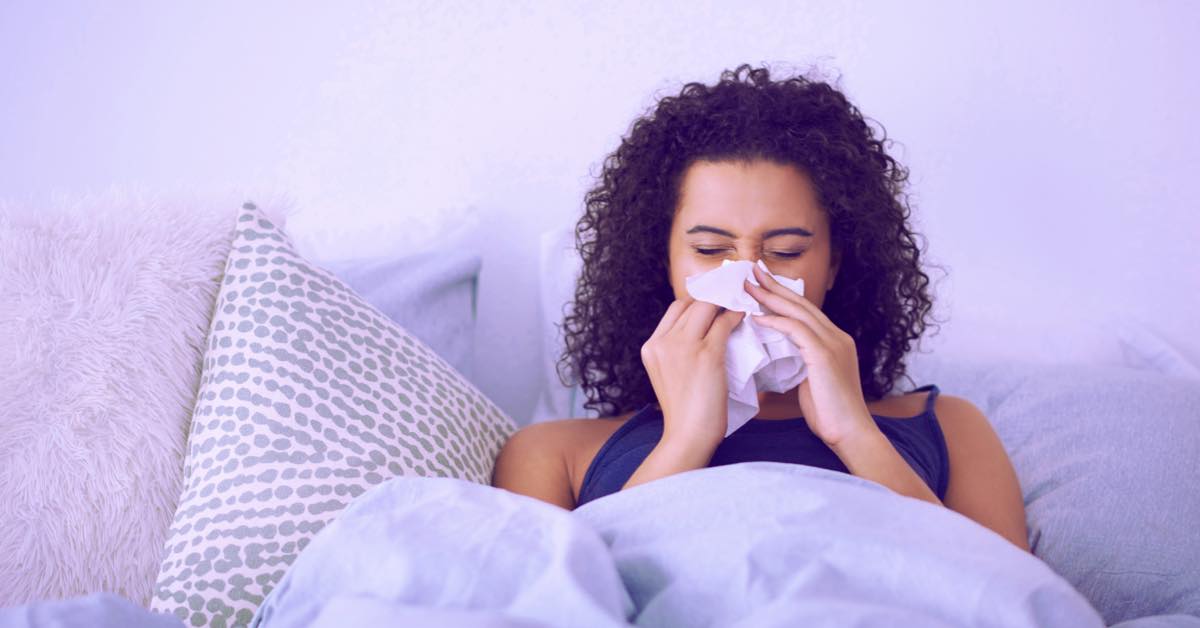Imagine this scenario: You’re down with a dreadful cold – your nose is stuffy, and your throat is parched. At times like these, we tend to contemplate whether alcohol can relieve our symptoms even temporarily. Before you grab that bottle wondering, if it’s the right move.
Let’s unravel the truth about mixing alcohol and colds.
Table of Contents
ToggleThe Temptation to Drink

Are you wondering why anyone would consider having a drink when they’re already sick? Perhaps it’s because some believe that alcohol can offer relief.
It can indeed numb the body and provide temporary alleviation of symptoms such as a sore throat or congested sinuses, but let’s take a closer look at why reaching for alcohol during a cold may not be the best idea.
1. It Does No Good
Despite being regarded by many as uplifting or soothing alcoholic beverages should be kept at bay, especially when suffering from a common cold virus or other infections that’s because it does more harm than good over time.
Alcohol serves as an intense diuretic agent that may leave you feeling parched even after taking several glasses of water alongside it. In contrast, ensuring a sufficient water intake helps flood toxins out of the system while promoting faster healing. Thus, gains all around.
Hence, avoid consuming alcohol if you want to conquer that cold quickly and regain optimal wellness levels soon.
2. Weakens Immune System
You should recognize that drinking alcohol has adverse effects on your body’s immunity levels. During sickness like a cold or flu that requires maximum participation of your immunity, consuming alcohol deteriorates its response, as mentioned earlier.
With body processes slowing down due to excessive intake of alcoholic beverages, means that fighting off an infection becomes harder – giving bacteria an upper hand. Consequently, trying to handle an acrobat’s performance while constructing a circus tent becomes problematic; despite being counterproductive in earning their trust for better outcomes.
3. Disrupts Sleep Quality
To ensure optimal restfulness level, remember that alcohol consumption may pose a challenge towards this objective. Obtaining ample rest is critical for the body’s recovery process, even more so when feeling sickly or weak.
While consuming liquor could cause an initial sense of exhaustion, continued use may result in disrupted sleeping patterns leading to poor-quality slumber instead. In essence, it’s like employing a marching band as an accompaniment to your bedtime – loud, disruptive, and far from soothing.
Consequences of Drinking Alcohol When You Have a Cold
Are you still thinking of grabbing and chugging that liquor down your throw while blowing your nose on the side? Then it is essential to weigh the ramifications of drinking alcohol while experiencing a cold, beginning with the most severe outcomes and proceeding to lesser ones.
1. Delayed Recovery
As per various findings from medical research, it is best that if you have a common cold, you abstain from taking alcohol until you’ve fully recovered.
They recommended this because, during an illness phase such as those experienced during the flu or cold, our body requires more energy levels than usual daily requirements for fighting off invading pathogens effectively.
However, alcoholic beverage consumption exerts its negative qualities by depleting vital fluids within our cells while suppressing our immune systems’ response. Hence, causing longer recovery times unnecessarily filled with discomfort-inducing symptoms such as cough and congested airways.
2. Increased Discomfort
Avoiding alcohol consumption while suffering from a cold is highly recommended due to its dehydrating effects that can aggravate an individual’s condition.
The consumption may cause inflamed throats and worsened nasal congestion, among other undesired results, eventually leading to headaches. To portray this situation aptly relates to putting salt over unsalted wounds- makes no sense!
3. Poor Sleep Quality
Initially causing sedation, consuming alcoholic beverages disrupts your sleep routine and impedes restful nights.
Essential for battling colds and illnesses alike, sufficient rest allows the body to recover fully; however, consuming alcohol jeopardizes this process by inducing poor-quality sleep that results in fatigue and grogginess.
4. Weakened Immune Response
Your ability to ward off the cold virus depends on having a resilient immune system. The problem arises when you consume alcohol, as this results in weakening your immunity and making it harder for your body to fight off infections.
It’s similar to sending unprepared soldiers onto a battlefield without adequate protection – they are unequipped or prepared enough; hence their effectiveness diminishes considerably.
5. Increased Complication Risks
When battling a cold, drinking alcohol can amplify the risk of developing complications. Your weakened immune system faces challenges fighting off secondary infections such as bacterial sinusitis or bronchitis, which could extend the duration of your sickness and mandate supplementary medical intervention.
Essentially, consuming alcohol sets up an invitation for trouble when you’re in a vulnerable state.
6. Increased Medication Side Effects
When under the weather, various drugs like Tylenol are available over-the-counter and prescribed for symptom relief, although blending them with alcoholic beverages yields undesirable effects such as increased sedative traits within cough syrups or cold medications, which results in excessive drowsiness and impaired coordination skills during routine activities.
Furthermore, alcohol diminishes specific antibiotics’ potential for bacterial infection defense, making them less effective at fulfilling their purpose; hence a person is playing roulette, risking their well-being.
7. Exacerbation of Gastrointestinal Issues
Unfortunately for those battling a cold or flu, combining it with alcoholic beverages can prove damaging to their body internally.
Alcohol contributes significantly towards inflammation within the gastrointestinal tract and thus intensifies symptoms like nausea, vomiting, and indigestion – which are already common side effects of cold or flu.
In simpler terms, drinking when you’re already battling a viral illness is unwise and could make matters worse!
8. Impaired Judgment and Decision-Making
Research has indicated that alcohol consumption harms cognitive abilities. The reason is that it further impairs decision-making by negatively impacting judgment faculties.
Suffering from colds or other illnesses recuperation requires disciplined behavior such as sleep practices. It promotes enough rest or adhering to medication consumption patterns with hydrating regularly.
But consuming alcohol retards the process by clouding one’s judgment capacities which makes making any rational decisions hardier even though necessary for achieving optimal well-being during tiring periods like these – just like navigating through foggy spectacles and falling victim to wrong turns.
9. Increased Fatigue and Weakness
It is well-known that alcohol acts as a depressive agent that induces sensations of tiredness and listlessness. When consumed in tandem with the enduring weariness associated with having a cold, these effects can intensify and worsen overall feelings of weakness.
It’s akin to trying to ascend a mountain wearing cumbersome lead anklets — each step becomes more burdensome than the last.
10. Negative Impact on Mental Health
It’s paramount to take into account how alcohol may influence our mental wellness when battling through a chilly bout. Alcohol is known for its depressing qualities; it only agitates symptoms related to anxiety and depression.
Integrating liquors during a weakened physical state intensifies low-spirited emotions and impedes overall recuperation progressions significantly. As they say- inviting trouble in challenging times is inviting dark clouds amidst storms!
11. Increased Risk of Accidents
Alcohol consumption can lead to impaired concentration and coordination issues. It compromises response times, which leads to danger if combined with existing health issues such as those caused by a common cold virus. It routinely causes dizziness or reduced alertness.
These factors are why accidents can happen with relative ease. In precarious scenarios such as navigating stairs, walking on wet floors, or engaging in any activity that doesn’t usually warrant caution but could turn hazardous quickly, alcohol consumption poses an additional layer of hazard.
It makes you feel like you’re treading on thin ice wearing shoes with your shoelaces tied together! The added risks and dangers demand that we exercise more caution under these circumstances.
12. Interference with Medication Absorption
Proper absorption within your digestive system is essential to receive maximum benefits from cold medicines. Conversely, drinking alcohol can impede this process and harm the delicate lining within both your stomach and intestines.
As a result of this disruption comes an increased likelihood for vital ingredients in cold treatments to fail to absorb completely – leading to lost potency or dire inefficacy altogether. Simply put – you’ll have built an unbreakable wall between yourself and potential relief from such medication upon digesting liquor alongside it!
Conclusion
What is your ideal choice in dealing with this dilemma? Despite being appealing to many people suffering from a common cold, drinking alcohol serves more harm than good. It can sabotage the natural healing processes needed by your body. And it can lead to prolonged recuperation periods and intensifying discomforting symptoms experienced while recovering.
It is easy to turn to alcohol as instant comfort when dealing with a cold, but that ‘quick fix’ isn’t ideal for promoting overall well-being. Prioritizing health is vital during such times of sickness – prompting natural remedies effective in supporting the immune system optimally while soothing the symptoms.
Remaining hydrated enables congested passages to clear up – consider opting for water or teas that come enriched with herbs delivering additional health benefits – while gentle broths ensure eased breathing patterns and quick healing.
Taking ample rest is imperative; allowing the body’s optimal time to recover at its own pace and providing nourishment through nutrient-rich meals keeps your strength against infections. As conventional wisdom indicates, when dealing with an achy throat, don’t underestimate grandma’s home remedy of chicken soup – its effectiveness far surpasses alcohol!
Next time you contemplate whether drinking during sickness works hand-in-hand or not, you can try laughter instead before choosing against spirits entirely.
Hoping nothing less than a quick and prosperous recovery for you!

I am a passionate beer connoisseur with a deep appreciation for the art and science of brewing. With years of experience tasting and evaluating various beers, I love to share my opinions and insights with others and I am always eager to engage in lively discussions about my favorite beverage.
















